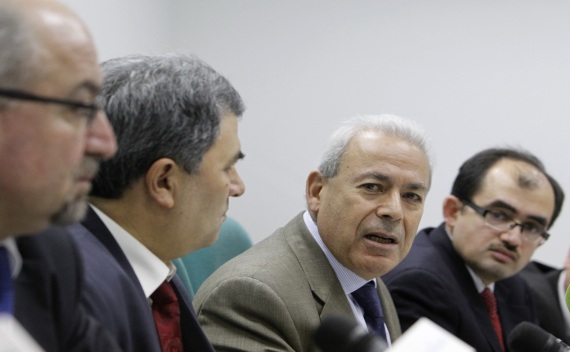Syria: Military Intervention A La Carte
By experts and staff
- Published
By
- Micah ZenkoSenior Fellow

After nine months of brutal repression that has killed over 3,500 people—the vast majority being nonviolent protestors—Syrian opposition groups are escalating the frequency and variety of their demands for international military support. What form that external intervention might take, what the intended military and political objectives would be, and what countries may contribute, remain altogether unclear.
“We are not in favor of the entry of foreign troops as was the case in Iraq but we want the international community to give us logistical support. We also want international protection, the establishment of a no-fly zone, a buffer zone and strikes on certain strategic targets considered as crucial by the regime.”
Col. Al-Assad has also repeatedly requested that other countries supply weapons to his militia.
Al-Assad’s statements are indicative of an increasing trend of Syrian opposition members—or foreign activists lobbying on their behalf—making selective demands of outsiders to provide military support, albeit on their own terms.
This represents the trend toward “intervention a la carte,” whereby overhead surveillance assets, logistical enablers, peacekeepers, armed drones, combat aircraft, ground troops, or smuggled weapons are demanded and presumably applied as opposition movements see fit.
This has been particularly evident in the public discussions on whether a no-fly zone (NFZ) should be imposed over Syria. An anonymous twenty-five year old FSA member boasted, “The [Assad] regime would only last thirty days” with a NFZ. Another FSA member, Lt. Col. Abdullah Yousef, claimed, “If there is such a zone, the regime will not last for a week.” Such wishful thinking is reminiscent of statements by Abdel Hafeez Goga, the deputy chief of the Libyan rebels’ Transitional National Council, who—before the western intervention—mistakenly believed, “We are capable of controlling all of Libya, but only after the no-fly zone is imposed.“
NFZs have the dual benefits of applying coercive pressure on a targeted regime while simultaneously allowing an opposition movement to claim that its uprising is free of foreign footprints on the ground. In Syria, however—as was true in Libya—a NFZ becomes irrelevant when civilians are mainly attacked by tanks and snipers on the ground. As the State Department spokesperson pointed out earlier this month, “What a no-fly zone does in a situation like that is not particularly clear.” Warnings from a Libyan doctor on the eve of NATO’s intervention also apply to Syria: “This no-fly zone doesn’t mean anything to us because Qaddafi only had a few planes and they were doing nothing. We need a no-drive zone because it is tanks and snipers that are killing us.”
Likewise, Syrian opposition groups do not agree on the intended objectives of international military support. All of the groups endorse President Assad’s downfall, including the Syrian National Council, which lists “toppling of the regime” as a founding goal. Yet, rather than simply acknowledging that outside intervention is to help assure regime change, each group claims that they only need support to protect civilians. Although this strategy makes sense after Libya demonstrated that a regime change double-team by domestic and external forces is a resource intensive, uncertain, and open ended commitment, it is impossible to distinguish between the two intertwined objectives. This was summarized in an interview with Burhan Ghalioun, the purported SNC spokesperson, when asked: “Is the international protection you are demanding intended to protect civilians or to topple the regime?” Ghalioun replied:
“Our goal is to protect civilians. Toppling the regime is the task of the Syrian people, not foreign forces. But protection would certainly help sustain the revolution and expand the base of those participating in it.”
Finally, apparently beggars can be choosers, as Syrian opposition groups are also selective about which countries should participate in the intervention. An elder statesman of the opposition, Haitham al-Maleh, initially called for NATO to intervene under the principle of R2P, but later clarified his position:“I do not and did not agree to NATO intervention…NATO means America and I’m against that.” Lt. Salem Odeh, a Syrian army defector, noted: “I just hope there will be Turkish military intervention. It’s better, and they have longstanding blood ties from old times, and they are closer to the East than West.” An exiled Muslim Brotherhood member agreed: “If other interventions are required, such as air protection…then the people will accept Turkish intervention. They do not want Western intervention.” Another, more tolerant, activist in Deir al-Zour welcomed the idea that “Arab governments should make a no-fly zone over Syria.”
Before NATO, Turkey (a NATO member, by the way), or “Arab governments” intervene in Syria, they must provide a plausible explanation as to how military force can succeed in civilian protection and/or regime change. Moreover, given the competing and disjointed demands among Syrian opposition groups, any intervention force should explain why it has privileged the interests of one group over another. Even then, the likelihood of the intervention succeeding is uncertain. The notion that external military force is an easily controlled tool that can be applied piecemeal to assure regime change is dubious. Nonetheless, if the level of violence against the civilian population worsens, and diplomatic and economic sanctions fail to compel a change in Assad’s behavior, it is an option that must be debated and considered.